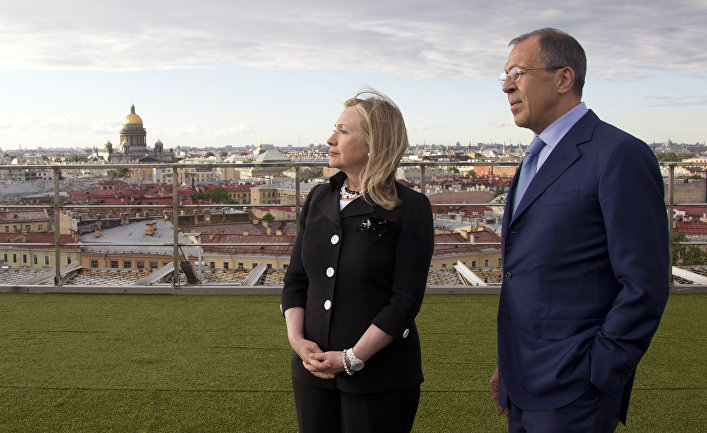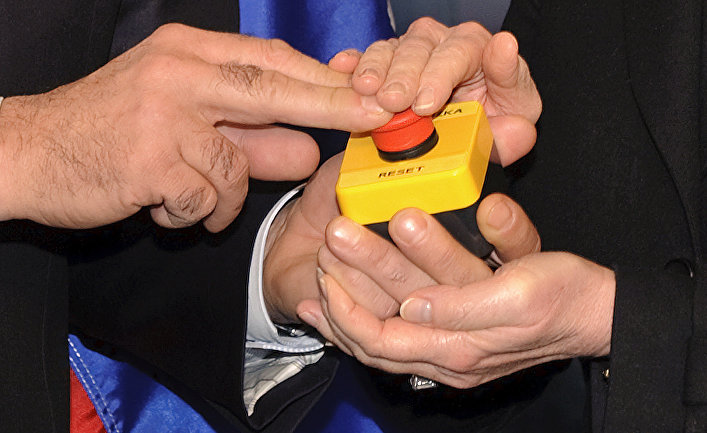The former US Secretary of State Hillary Clinton said at the Democratic debates that, if she is elected President she can start a new reset campaign with Russia, but her determination will depend on the readiness of Kremlin to compromise.
"Well, it depends on what I get in return," Clinton commented responding to a question about the possibility of a new reset with Russia, during the debates between US Democratic Party representatives.
Clinton claimed that during her administration work, the reset with Russia had brought the US a new nuclear weapons reduction treaty, the transit route to supply US and NATO forces in Afghanistan, as well as the support of the US sanctions in Iran. "It's always important in diplomacy to understand the interests of your opponent” the former Secretary of State continued. “And at the same time to use all the opportunities to advance of your own security and values."
Would Clinton offer a "re-set button" to Russia's Vladimir Putin. "It would depend on what I got for it," she says. #DemDebate
— USA TODAY 2016 (@usatoday2016) January 18, 2016
Having served as the US Secretary of State, Clinton together with the Vice President Joe Biden actively pursued a reset policy with Russia. The idea of the reset is a changing tone in Russian foreign policy, which ended in deadlock after the military conflict between Russia and Georgia in August 2008. "The dialogue almost stopped and our relations then dropped to a new low - now we know that it could be even worse," political scientist and a scholar of American studies Igor Zevelev told Gazeta.ru.
The ideas forming the foundation of the reset policy have been developed by Michael McFaul, former assistant to then new US President Barack Obama. Afterwards, McFaul also served as US Ambassador to Russia. He became the first political appointee to Moscow in many years and put the emphasis on the "soft power” concept, including interaction with the Russian civil society and political opposition.
A "reset" then started with presenting a stylized button that US Secretary of State Clinton pressed together with the Russian Foreign Minister Lavrov in March 2009. However, the Russian translation of the word "reset" on the button was mistakenly and ironically written as "overload". Then-Russian President Dmitry Medvedev largely contributed to the "reset", whose foreign policy rhetoric was much milder than that of President Putin. Moreover, Dmitry Medvedev and Barack Obama have established good personal relations.
According to Hillary Clinton, the "reset" achievements include the signing of the Strategic Offensive Reductions Treaty, the opening of transit for the US and NATO non-military cargo through the Russian territory (the United States did not use it because of its high cost — Gazeta.ru), as well as Russian support of sanctions against Iran. Some US experts believe that due to positive signals from Washington, Russia abstained from the veto against the resolution on Libya in 2011. The adoption of this document actually gave a "green light" to the US and NATO military operation in the country. However, Medvedev was in a bitter dispute with then-Prime Minister Putin, who strongly opposed Libya resolution. The US also made a compromise towards Russia during this "reset" period — President Obama went to the length of a reduction of his predecessor George W. Bush's missile defense plans in Europe, as well as pushed aside the ascension of Georgia and Ukraine into NATO. According to the former US Ambassador Michael McFaul in an interview to Gazeta.ru, the question of NATO expansion "seemed closed."
The "reset" idea has practically come to a full stop by the end of Medvedev's presidency. Both countries started to feel an increase in irritation with each other. Failing to get the US's guarantees that its missile shield is not aimed at Russia, in his turn Medvedev threatened the West to deploy Iskander missiles in Kaliningrad.
Clinton's "reset" invoke, looks like an intention to remind her voters about her foreign policy achievements. Clinton is the only presidential candidate who has high level experience in the White House, and it sets her apart from the others. Clinton herself said that Russian President Vladimir Putin and she have established "respectful" relations, noting that they also had very difficult moments of communication with each other.
Clinton: My relationship with Putin is 'interesting' #DemDebate https://t.co/xf1VM3urm3
— NBC News (@NBCNews) January 18, 2016
According to a political scientist and US-Russia relations expert Victor Mizin, Clinton is trying to take advantage of her merits in the foreign policy with Russia, as well as to "maneuver, showing unusual flexibility." He also recalls that Clinton was rather tough speaking about Russia before. The expert suggested that her statements about the possible "reset" with Russia were connected to the popularity of her rival Republican candidate Donald Trump, who recently declared his willingness to improve relations with Russian President Putin.
However, despite Clinton's well established popularity within the party and her solid experience, it will be hard to convince the voters that she would cope well with the foreign policy. She is still not forgiven for the her mistake with the assassination of US Ambassador in Libya in 2012. It happened, according to Clinton's opponents, because of her neglect of the Embassy's security problems. On top of this, the personal email scandal still recoils her.
Entire article on Clinton allies saying she is repeating all the same mistakes as 2008 campaign @patrickhealynyt: https://t.co/NgXlRC7RBQ
— Ari Melber (@AriMelber) January 17, 2016
Professor of American studies Igor Zevelev believes that one should not overestimate the importance of Clinton's statements, since they are in line with Obama's policy, the main point of which is "act hard but always leave some room for the dialogue." According to Zevelev, Clinton is being realistic when says she is ready to make concessions if she gets something in return, "Such an approach has always been welcomed in Russia," says Zevelev.
It is worth noting, that a more realistic foreign policy is being talked about in various expert circles in the US lately. "If the leadership in charge of US foreign policy over the past 20 years was realistic, it could have been possible to avoid many expensive failures" Foreign Policy magazine reports.







